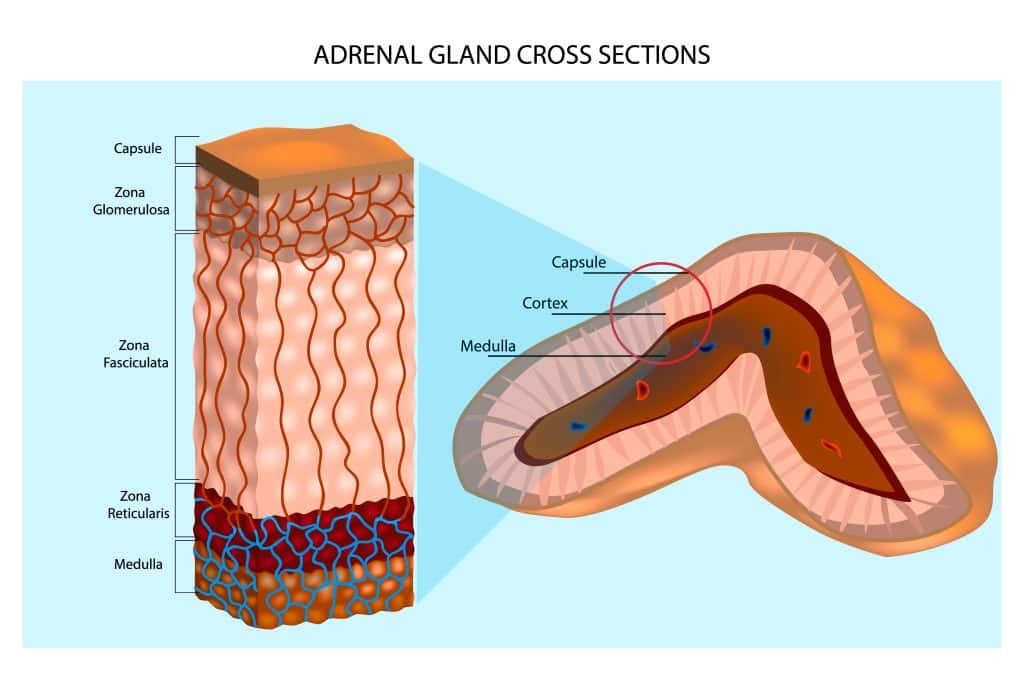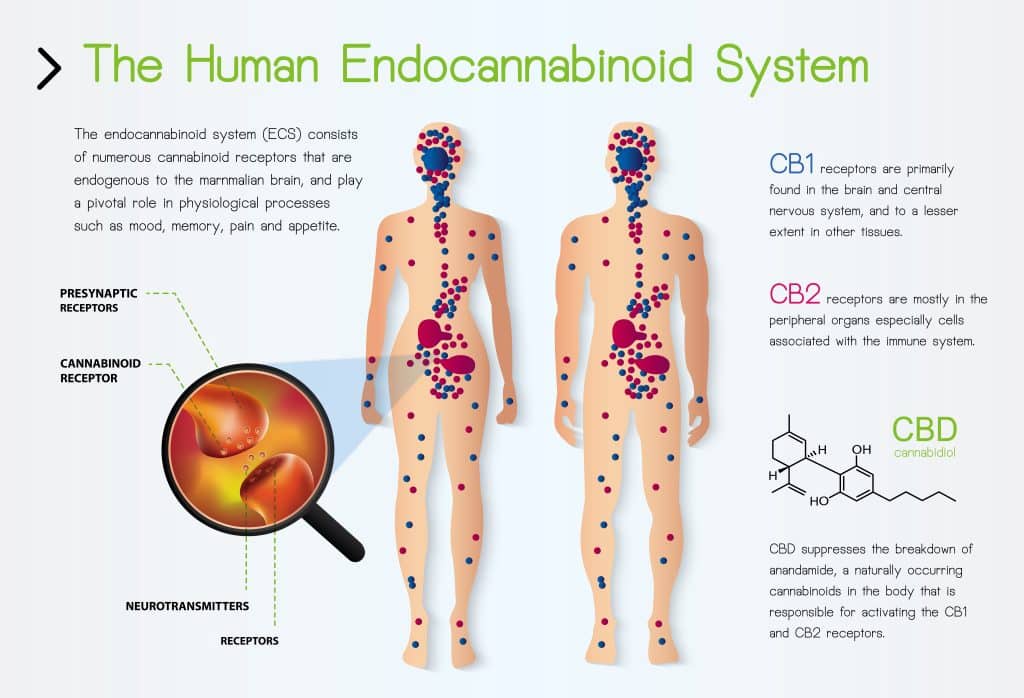Adrenal fatigue occurs when the adrenal glands are not functioning correctly. The adrenal glands are small organs above the kidneys that produce hormones, which act as chemical messengers, helping to regulate metabolism, immune system, blood pressure, response to stress as well as other essential functions. In short, the adrenals produce the hormones needed to live a full and healthy life. Can cannabis help treat and manage adrenal fatigue?
Function of the Adrenal Glands
Each adrenal gland is composed of two parts: the outer part called the adrenal cortex and the inner part called the adrenal medulla. The adrenal cortex and adrenal medulla produce very different hormones. Each part of the adrenal gland produces a different hormone with a key function. For example, the adrenal cortex produces a variety of hormones including aldosterone, cortisol and sex hormones.
ADRENAL MEDULLA
The adrenal medulla produces catecholamines, or adrenaline type hormones such as epinephrine and norepinephrine. These hormones are activated when something unexpected happens, causing a feeling of panic, or the desire for “fight or flight.” This feeling or stress response is the result of adrenaline being released from the adrenal glands. This adrenaline is made up of epinephrine and norepinephrine produced by the adrenal medulla. Physiological markers of a stress response include increased heart rate, blood pressure, breathing rate, dilated pupils, and flushed or pale complexion.
ADRENAL CORTEX

The adrenal cortex produces three hormones from three different layers:
- The Zona Glomerulosa (ZG): The ZG produces mineralocorticoids, the most important of which is aldosterone, a hormone that’s necessary for fluid and electrolyte (salt) balance, and also helps maintain blood pressure. Aldosterone helps the kidney conserve salt when it’s needed. It acts in the kidney to retain water and salt and release potassium. Too much aldosterone can cause high blood pressure, known as hypertension. Whereas too little aldosterone can lead to the loss of too much salt and water, causing dehydration, and also low blood pressure.
- The Zona Fasciculata (ZF): The ZF produces glucocorticoids, predominantly cortisol, known as the body’s natural steroid. This hormone is involved in the response to illness and also helps to regulate the body’s metabolism. It stimulates glucose production to help maintain blood glucose levels and has anti-inflammatory effects.
- The Zona Reticularis (ZR): The ZR stores cholesterol to be later used for the making of steroid hormones, and it also secretes of sex hormones, estrogen and testosterone. About 40% of female estrogen and progesterone and about 40% of male testosterone are made in the adrenal glands.
What is Adrenal Fatigue?
According to Dr. James L Wilson, author of the book, “Adrenal Fatigue: The 21st Century Syndrome,” says that the adrenals are “the first to respond to stress but they’re also the first to suffer as a result of stress.” Any kind of excess stress causes the adrenals to increase cortisol production. Adrenal fatigue occurs when the adrenals can no longer secrete adequate levels of cortisol for optimal function.
The stressors can be environmental, dietary or emotional. Grief, trauma and certain autoimmune conditions can negatively impact the function of the adrenal glands. And because the adrenal glands regulate the function of so many of the body’s organs via hormone release, a dysfunctional adrenal gland can lead to a host of symptoms. However, because the symptoms of adrenal fatigue are similar to those of other conditions, there’s some controversy over the diagnosis and treatment of adrenal fatigue.
One outcome of prolonged elevated levels of cortisol is Cushing’s disease. People with Cushing’s disease tend to have large deposits of fat on the stomach and upper back, rounded face, pink or purple stretch marks, high blood pressure, bone loss and in some cases, diabetes type 2. Because elevated cortisol levels can potentially have such detrimental effects on overall health, it’s important to catch this condition as early as possible.
Symptoms of Adrenal Fatigue
Common symptoms of adrenal fatigue include the following:
- Feelings of tiredness in the morning upon waking and crashes throughout the day
- High anxiety
- Mood swings
- Brain fog
- Increased energy in the evenings
- Cravings for salty or sweet foods
- Overuse of caffeine or other stimulants
- A compromised immune system
Less common symptoms include:
- Insomnia
- Frequent urination
- Loss of muscle tone
- Poor circulation
- Depression
- Weight gain
- Decreased libido
Understanding Stress Response
The endocrine system is a chemical messaging system that identifies changes in the body and sends out messengers (hormones) that tell the body how to respond. It’s made up of a complex network of organs and glands that coordinate and cooperate via hormones to control the body’s metabolism, energy levels, reproduction, growth, injury, illness, stress and mood.
The adrenal glands are part of the endocrine system, along with other organs and glands including the hypothalamus, pituitary, thyroid, pancreas, ovary and testes.
We appreciate you joining us. Sign up for the Cannadelics Weekly Newsletter to get updates direct to your email; and for sweet offers on cannabis flowers, vapes, edibles, smoking equipment, cannabinoid compounds, and even some psychedelics. Everyone get stoned responsibly!
The hypothalamic-pituitary-adrenal axis (HPA axis) links the central nervous system to the endocrine (hormonal) system, and is a pathway between the adrenal glands and the brain that controls stress response. The HPA axis modulates the production of cortisol. The two main stress hormones are epinephrine, which triggers the sympathetic nervous system, and cortisol, which provides energy needed by the body in order to deal with the stressor.
When a stressor is perceived, the hypothalamus releases Corticotrophin Releasing Factor (CRF), signaling the pituitary gland to produce Adrenocorticotrophic hormone (ACTH), which triggers the adrenals to produce cortisol. Cortisol mobilizes glucose stored in the liver, creating a supply of energy for the body when confronting a stressor. This action can last a few minutes or hours depending on the level of stress.
Once an optimal level of cortisol has been released, cortisol then signals a negative feedback to tell the hypothalamus and pituitary to stop producing CRF and ACTH. Via this mechanism, homeostasis is restored. Cortisol production is controlled by pineal gland and linked to circadian rhythm, which causes it to peak in the early hours of the day and taper off during the course of the day.
However, people who are dealing with stress throughout the day can create surges of cortisol that override the circadian pattern. As a result, the pathway adapts, causing sustained activation of the HPA axis, which can lead to a cascade of negative effects on immune function, blood sugar levels, lipid metabolism, bone metabolism, digestion, brain function and more. These effects can manifest as depression, anxiety, obesity, and heart disease.
Adrenal Glands and Cannabis

The endocannabinoid system is a physiological system made up of CB1 and CB2 receptors, located throughout the body. CB1 receptors are found mostly in the central nervous system as well as in adipose tissue and endocrine organs. CB2 receptors are found in the peripheral nervous system and the immune system.
Endogenous cannabinoids have been showed to control appetite, food intake, energy balance, and have a significant impact on the endocrine system, including the activity of the pituitary gland, adrenal cortex, thyroid gland, pancreas and gonads. A 2009 study demonstrated the expression of CB1 in the adrenal cortex and the function of the endogenous cannabinoid anandamide in stimulating the release of mineralocorticoids, in particular aldosterone.
Though early studies suggested that cannabis exerted stress on the HPA axis, more recent studies suggest the presence of endocannabinoid tone, and the importance of maintaining it for overall health. For example, a study on mice lacking CB1 receptors proved that these receptors play an essential role in optimal performance of the HPA axis. It’s now believed an altered cannabinoid tone could lead the development of stress-related conditions including anxiety, depression and obesity.
Cannabis and Adrenal Fatigue
Even though cannabis doesn’t stress the adrenals as much as other stimulants such as nicotine and caffeine, it’s important to note that long-term use may cause tiredness if the adrenals are compromised, as they would be with adrenal fatigue syndrome.
While some studies have shown that tetrahydrocannabinol (THC) can spike cortisol levels, further studies have shown that cannabidiol (CBD) has the opposite effect, lowering cortisol levels. In decreasing cortisol levels, CBD could also benefit insulin sensitivity, immune system function, metabolism, bone strength and more.
A common symptom of adrenal fatigue syndrome is sleep disruption, or even insomnia. Though cannabis has been shown to disrupt REM sleep, it does help people fall asleep faster, and stay asleep for longer. As sleep is essential for correcting adrenal fatigue, cannabis could be beneficial in this regard.
When the adrenals are overworked, it can lead to lightheadedness or dizziness, caused by a drop in blood sugar levels. Cortisol in linked to insulin function, and CBD has been showed to decrease insulin levels, leading to more balanced blood sugar levels.
FINAL THOUGHTS
What’s important to take note of here is the ratio of THC and CBD in the strain of cannabis being consumed. It would appear that strains with a higher ratio of CBD to THC would be more suitable for people with adrenal fatigue syndrome. In short, stay away from those high potency THC strains and opt for a full spectrum flower with a mellower effect.
Also potentially beneficial is a full spectrum CBD oil made from hemp with trace amounts of THC as well as other cannabinoids and terpenes. For now, a more exact cannabis therapy for adrenal fatigue is years away, but as incidences of adrenal fatigue syndrome continue to rise worldwide pressure is on to explore new therapies.
Hello readers! We appreciate you stopping by Cannadelics.com; an independent news platform that specializes in cannabis and psychedelics reporting. Stop by regularly to stay informed on all happenings, and subscribe to the Cannadelics Weekly Newsletter, to ensure you’re never late to get the news.
The post Can Cannabis Help with Adrenal Fatigue? appeared first on Cannadelics.
Via https://cannadelics.com/2023/01/01/can-cannabis-help-with-adrenal-fatigue/
source https://rosalinaklerkx.weebly.com/blog/can-cannabis-help-with-adrenal-fatigue
No comments:
Post a Comment